#Rogoff
Text

NASTY, NOV 2023 | HEAVENLY
PHOTOGRAPHY: THOMAS CHIMNEY
ART DIRECTION: OWEN ROGOFF
141 notes
·
View notes
Text

Flo Dron by Marc Rogoff
63 notes
·
View notes
Quote
The next day, I left Moscow.
Natasha Lance Rogoff, from Muppets in Moscow
11 notes
·
View notes
Text

first, the raven
#studyblr#bookblr#seth rogoff#dark academia#gay academia#chaotic academia#english major#studyffocation
6 notes
·
View notes
Text
中國在南美的經濟規模 已超越美國成最大夥伴
作者羅格夫(Kenneth Rogoff)是國際貨幣基金前首席經濟學家, 哈佛大學經濟學和公共政策教授
中國在南美洲的經濟足跡在過去幾年間明顯擴大,已超越美國成為最大的交易夥伴。儘管美國總統拜登矢志抗衡中國的地緣政治野心,卻大大忽視中國在其周邊地區的勢力愈來愈大。這是令人費解也令人警醒,尤其是南美洲在因應氣候變遷方面的關鍵角色。
4月稍早,巴西總統魯拉(Luiz Inácio Lula da…
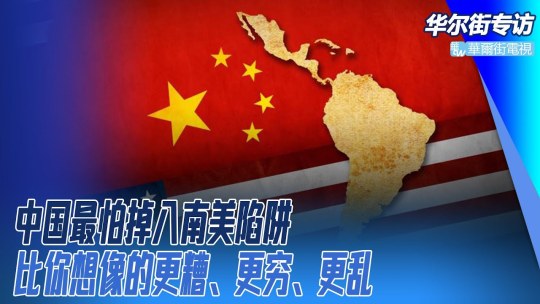
View On WordPress
1 note
·
View note
Text
THE UNEXPECTED CRAZY TRUE STORY
Today’s guest is Natasha Lance Rogoff, who is an award-winning American television producer, filmmaker, and journalist who has produced news and documentaries in Russia, Ukraine, and the former Soviet Union for CBS, NBC, and PBS.
Natasha produces content for television and digital platforms and is the CEO of an Ed-Tech Company, An Associate Fellow in Harvard University’s Art, Film, and Visual…

View On WordPress
#Betsy Wurzel#Documentaries#Film Producer#Martha Stewart Living Magazine.#Moscow#Muppets in Moscow#Natasha Lance Rogoff#Russia#Sesame Street#Television#Ukraine#Young adults
0 notes
Quote
Raising my hand, I propose that Ulitsa Sezam could feature, for example, a segment showing children running a lemonade stand as a way of teaching about business and teamwork.
The group is horrified — not only by the idea of children selling items on the street but also at the thought of showing children engaged in what one participant calls “dirty mercantile activities.” “Only desperate, poor people sell stuff on the street to survive and it’s dangerous,” one educator argues. Another admonishes, “It’s not right to show children trying to earn money — it encourages individual greed.” I hadn’t anticipated my example would provoke such reactions. Of course, though, it makes sense — in Soviet times, selling items on the street was illegal, and only the poorest Russians or Mafia resorted to street commerce.
Adapting Sesame Street for Russian TV — What Could Go Wrong?
#sesame street#russia#soviet union#economics#capitalism#tv#history#Natasha Lance Rogoff#vulture#literature#book excerpt
0 notes
Text
Edward Rogoff : 7 citations inspirantes
Clique-ici pour découvrir Edward Rogoff et ses 7 citations inspirantes.
• Si vous êtes né pauvre, ce n’est pas de votre faute. Mais si vous mourez pauvre, c’est votre choix.
• L’argent ne vous apportera pas le bonheur, mais je préfère pleurer dans une Mercedes que dans un bus.
• « Leur façon de devenir riche est de gagner de l’argent, pas de le sauver. »
• Tout est possible avec un dollar et un rêve.
• Celui qui a le plus d’argent sera en mesure de posséder le…

View On WordPress
0 notes
Note
I saw your tags on the post about trick or treaters not speaking and I am v interested in hearing more of your thoughts on the concept of “developmental delays”! I‘ve seen the idea that disability is a construct, but I’m not as familiar with the idea that development is also a construct. You have really great takes as an educator and someone who like, actually GETS how kids work, so I am interested in your thoughts!
I also know that posting on this subject might be poking the bear, so it is 1000% cool if you would rather not comment 💜 Tysm!
Oh I'm happy to talk about it! I love talking about this stuff, thank you for asking me to 💙
This isn't exactly new ground; there's been plenty of research into and writing on the subject, and deconstructing "development" as a static concept was, ironically, a huge part of my most recent development class.
The idea is that our understanding of "benchmarks" of development, which informs the larger concept of development as a whole, is heavily rooted in the assumption that Western culture is The Standard. We prioritize walking, talking, reading, and writing, which means we cultivate these skills in our children from a young age, which means they develop those skills more quickly than they do others.
To use one of my favorite examples from Rogoff, 2003, Orienting Concepts and Ways of Understanding the Cultural Nature of Human Development:
Although U.S. middle-class adults often do not trust children below about age 5 with knives, among the Efe of the Democratic Republic of Congo, infants routinely use machetes safely (Wilkie, personal communication, 1989). Likewise, Fore (New Guinea) infants handle knives and fire safely by the time they are able to walk (Sorenson, 1979). Aka parents of Central Africa teach 8- to 10-month-old infants how to throw small spears and use small pointed digging sticks and miniature axes with sharp metal blades:
"Training for autonomy begins in infancy. Infants are allowed to crawl or walk to whatever they want in camp and allowed to use knives, machetes, digging sticks, and clay pots around camp. Only if an infant begins to crawl into a fire or hits another child do parents or others interfere with the infant’s activity. It was not unusual, for instance, to see an eight month old with a six-inch knife chopping the branch frame of its family’s house. By three or four years of age children can cook themselves a meal on the fire, and by ten years of age Aka children know enough subsistence skills to live in the forest alone if need be. (Hewlett, 1991, p. 34)" (pg. 5)
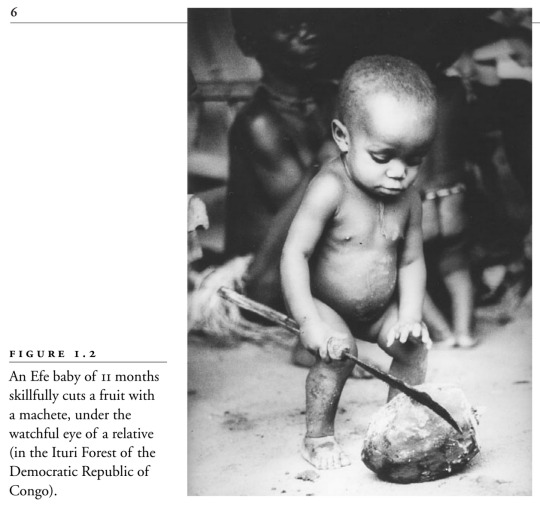
In the US we would view "letting an 8-month-old handle a knife" as a sign of severe neglect, but the emphasis here is placed on the fact that these children are taught to do these things safely. They don't learn out of necessity, or stumble into knives when nobody is watching; they learn with care, support, and safety in mind, just like children here learn. It makes me wonder if Aka parents would view our children's lack of basic survival skills with the same concern and disdain as USAmerican parents would view their children's inability to read.
Do we disallow our children from handling knives because it is objectively, fundamentally unsafe for a child of that age to do so- because even teaching them is developmentally impossible- or is that just a cultural assumption?
What other cultural assumptions do we have about child development?
Which ties in neatly with various social-based models of disability, particularly learning and, of course, developmental disabilities. If your culture doesn't value the things you are good at, and you happen to struggle with the things it does value, what kinds of assumptions is it likely to make about you? How will it pathologize you? What happens to that culture if it understands those values to be arbitrary, in order to accommodate your unique existence?
#education#childcare#disability#ftr I am specifically saying that it adds an important and interesting dimension to models of disability based on the social model#because disability is a complex combination of social/cultural and legitimately limiting factors that people to this day#are still trying to define in an inclusive and effective way#(and probably will be forever because it's so tied up in social/cultural and political stuff)#I dont want to imply that disability is 100% entirely made up- but it also isn't 100% entirely 'objective physical reality' or whatever.#its complicated. ill have better thoughts when im not just like 5 weeks into my first disability studies class lmao
174 notes
·
View notes
Text

Flo Dron by Marc Rogoff
39 notes
·
View notes
Text
my current dream is to do a 4 part series showing how the alpha guardians prepare for the coming of children they will never see, with Dave's part taking inspiration from Natasha Lance Rogoff's Muppets in Moscow, Rose's part being a House of Leaves/Ghost Quartet style circular narrative, John's part being styled as trying to perfect a comedy set a la Inside, and Jade hiding the most precious secret of all: that, unlike the rest, she alone has the privilege of meeting her grandson.
#homestuck#alpha guardians#dave strider#rose lalonde#john egbert#jade harley#alpha dave#alpha rose#alpha jade#alpha john#if only i had the TIME-#homemakers au
40 notes
·
View notes
Text

Don't know what to get for someone's Christmas present?
How about a fictional trip to Lisbon, Portugal?
Try it, they may like it.
4 notes
·
View notes
Text
A dozen poor countries are facing economic instability and even collapse under the weight of hundreds of billions of dollars in foreign loans, much of them from the world’s biggest and most unforgiving government lender, China.
An Associated Press analysis of a dozen countries most indebted to China — including Pakistan, Kenya, Zambia, Laos and Mongolia — found paying back that debt is consuming an ever-greater amount of the tax revenue needed to keep schools open, provide electricity and pay for food and fuel. And it’s draining foreign currency reserves these countries use to pay interest on those loans, leaving some with just months before that money is gone.
Behind the scenes is China’s reluctance to forgive debt and its extreme secrecy about how much money it has loaned and on what terms, which has kept other major lenders from stepping in to help. On top of that is the recent discovery that borrowers have been required to put cash in hidden escrow accounts that push China to the front of the line of creditors to be paid.
Countries in AP’s analysis had as much as 50% of their foreign loans from China and most were devoting more than a third of government revenue to paying off foreign debt. Two of them, Zambia and Sri Lanka, have already gone into default, unable to make even interest payments on loans financing the construction of ports, mines and power plants.
In Pakistan, millions of textile workers have been laid off because the country has too much foreign debt and can’t afford to keep the electricity on and machines running.
In Kenya, the government has held back paychecks to thousands of civil service workers to save cash to pay foreign loans. The president’s chief economic adviser tweeted last month, “Salaries or default? Take your pick.”
Since Sri Lanka defaulted a year ago, a half-million industrial jobs have vanished, inflation has pierced 50% and more than half the population in many parts of the country has fallen into poverty.
Experts predict that unless China begins to soften its stance on its loans to poor countries, there could be a wave of more defaults and political upheavals.
“In a lot of the world, the clock has hit midnight,” said Harvard economist Ken Rogoff. “ China has moved in and left this geopolitical instability that could have long-lasting effects.”
HOW IT'S PLAYING OUT
A case study of how it has played out is in Zambia, a landlocked country of 20 million people in southern Africa that over the past two decades has borrowed billions of dollars from Chinese state-owned banks to build dams, railways and roads.
The loans boosted Zambia’s economy but also raised foreign interest payments so high there was little left for the government, forcing it to cut spending on healthcare, social services and subsidies to farmers for seed and fertilizer.
In the past under such circumstances, big government lenders such as the U.S., Japan and France would work out deals to forgive some debt, with each lender disclosing clearly what they were owed and on what terms so no one would feel cheated.
But China didn't play by those rules. It refused at first to even join in multinational talks, negotiating separately with Zambia and insisting on confidentiality that barred the country from telling non-Chinese lenders the terms of the loans and whether China had devised a way of muscling to the front of the repayment line.
Amid this confusion in 2020, a group of non-Chinese lenders refused desperate pleas from Zambia to suspend interest payments, even for a few months. That refusal added to the drain on Zambia’s foreign cash reserves, the stash of mostly U.S. dollars that it used to pay interest on loans and to buy major commodities like oil. By November 2020, with little reserves left, Zambia stopped paying the interest and defaulted, locking it out of future borrowing and setting off a vicious cycle of spending cuts and deepening poverty.
Continued in the link
14 notes
·
View notes
Text
After the collapse of the Soviet Union in the early 1990s, the timing appeared perfect to bring Sesame Street to millions of children living in the former Soviet Union. With the Muppets envisioned as ideal ambassadors of Western values, no one anticipated just how challenging and dangerous this would prove to be.
In Muppets in Moscow: The Unexpected Crazy True Story of Making Sesame Street in Russia, Natasha Lance Rogoff brings this gripping tale to life. Amidst bombings, assassinations, and a military takeover of the production office, Lance Rogoff and the talented Moscow team of artists, writers, musicians, filmmakers, and puppeteers remained determined to bring laughter, learning, and a new way of seeing the world to children in Russia, Ukraine and across the former Soviet empire. With a sharp wit and compassion for her colleagues, Lance Rogoff observes how cultural clashes colored nearly every aspect of the production—from the show’s educational framework to writing comedy to the new Russian Muppets themselves—despite the team’s common goal.
Brimming with insight and nuance, Muppets in Moscow skillfully explores the post-Soviet societal tensions that continue to thwart the Russian people’s efforts to create a better future for their country. More than just a story of a children’s show, this book provides a valuable perspective of Russia’s people, their culture, and their complicated relationship with the West that remains relevant even today.
14 notes
·
View notes
Text
Chess Kings MBTI
Here are a few top thinking type men chess players by MBTI
NT
ENTJ Viswanathan Anand, Vladislav Artemiev, Laurent Fressinet, Daniel Naroditsky, David Navara, Nihal Sarin

INTJ David Anton Guijarro, Bai Jinshi, Leinier Dominguez, Robert Hungaski, Mircea Parligras, Kenneth Rogoff, Adam Tukhaev

ENTP Nodirbek Abdusattorov, Benjamin Bok, Daniil Dubov, Jan-Krzysztof Duda, Surya Shekhar Ganguly, Anish Giri, GN Gopal, Nils Grandelius, Vladimir Kramnik, Le Quang Liem, Peter Leko, Leon Luke Mendonca, Elshan Moradiabadi, Parimarjan Negi, Ni Hua, Ruslan Ponomariov, Teimour Radjabov, Kirill Shevchenko, Loek Van Wely, Nikita Vitiugov

INTP Michael Adams, Ferenc Berkes, Gillian Bwalya, Fabiano Caruana, Bogdan-Daniel Deac, Kamil Dragun, Brewington Hardaway, Brandon Jacobson, Denis Lazavik, Marc’Andria Maurizzi, Jergus Pechac, Vahap Sanal, Samuel Sevian, Dariusz Swiercz, Nikolas Theodorou, Veselin Topalov
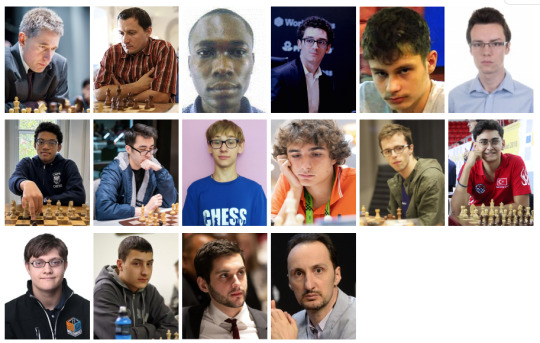
ST
ESTJ Dmitry Andreikin, Maurice Ashley, Magnus Carlsen, Cristian Chirila, Jan Gustafsson, Aleksandar Indjic, Shakhriyar Mamedyarov, Karthikeyan Murali, Thai Dai Van Nguyen, Sam Shankland, Amin Tabatabaei
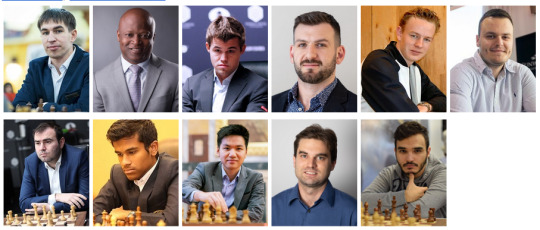
ISTJ Cemil Can (JJ) Ali Marandi, Sandipan Chanda, Lance Henderson de La Fuente, David Silva, Wesley So, Lucas Van Foreest

ESTP Bobby Fischer, Baadur Jobava, Garry Kasparov, Viktor Korchnoi, Igor-Alexandre Nataf, Hans Niemann, Praggnanandhaa Rameshbabu, Boris Spassky, Eugene Torre
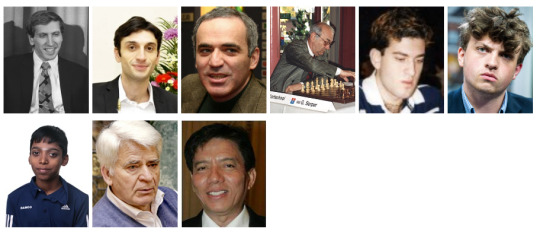
ISTP Kirill Alekseenko, Juan Manuel Bellon Lopez, Bobby Cheng, Gukesh Dommaraju, Alexander Grischuk, Andrew Hong, Anatoly Karpov, Javokhir Sindarov, Andrew Tang, Maxime Vachier-Lagrave, Jorden Van Foreest, Wei Yi
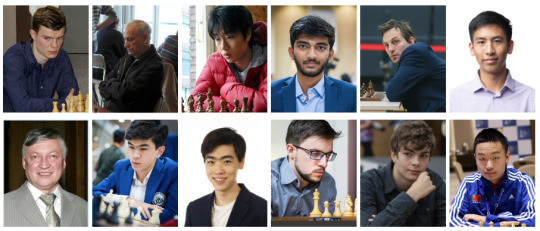
8 notes
·
View notes
